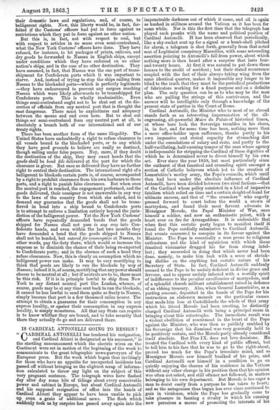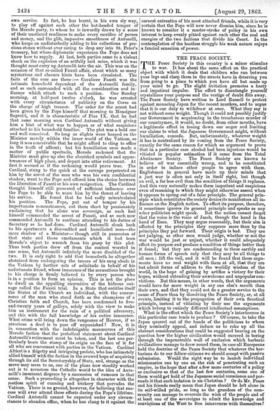IS CARDINAL A_NTONELLI GOING TO RESIGN?
" ARDINAL ANTONELLI has tendered his resignation, 1../ and Cardinal Altieri is designated as his successor," is the startling announcement which the electric wires on the Continent were set in motion at the beginning of the week to communicate to the great telegraphic news-purveyors of the European press. But the week which began thus invitingly for those who have an appetite for unexpected incidents has passed off without bringing us the slightest scrap of informa- tion calculated to throw any light on the subject of this very pregnant sentence. The telegraph wires have flashed day after day some bits of tidings about every conceivable power and cabinet in Europe, but about Cardinal Antonelli and his supposed resignation of office into the hands of Cardinal Altieri they appear to have been unable to pick up even a grain of additional news. The flash which suddenly took us by surprise has passed away again into the impenetrable darkness out of which it came, and all is again as hushed in stillness around the Vatican as it has been for some while. Nor is this the first time that the telegraph has played such pranks with the name and political position of Cardinal Antonelli. It has been observed that periodically, like a sky-rocket sent up for a signal or a bomb-shell pitched for alarm, a telegram is shot forth, generally from that noted seat of Legitimist conspiracy Marseilles, with some astounding assertion pointing to Antonelli's fall from power, about which nothing more is then heard after a surprise that lasts four- and-twenty hours. At first it was natural to put down-these hoaxes to the credit of accident ; but their stated recurrence coupled with the fact of their always taking wing from the same identical quarter, makes it impossible any longer to be blind to the truth that they must be the periodical productions of fabricators working for a fixed purpose and on a definite plan. The only question can be as to who may be the men who are pulling the strings of this contrivance, and the answer will be intelligible only through a knowledge of the present state of parties in the Court of Rome. Cardinal Antonelli, the Minister who to most of us abroad stands forth as an interesting impersonation of the all- engrossing, all-powerful Maire du Pelvis of historical times, at whose bare look the Sovereign trembles in his shoes, is, in fact, and for some time has been, nothing more than a mere office-holder upon sufferance, thanks partly to his own impassive and stoical capacity for stomaching dirt under the consolations of salary and state, and partly to the half-vacillating, half-cunning temper of the man whose agency is indispensable for stripping the Cardinal of those dignities of which he is determined never to divest himself by his own act. Ever since the year 1859, but most particularly since the outburst of that fanatical and crusading spirit amongst a section of Catholic believers which led to the creation of Lamoriciere's motley army, the Pope's councils, which until then had been under the absolute influence of Cardinal Antonelli, have been divided between two rival factions—that of the Cardinal whose policy consisted in a kind of impassive fatalism which relied on time and a certain sleight-of-hand for ultimate success, and that of "the crusaders" who eagerly pressed forward to court before the world a crown of martrydom, and found their most fervent advocate in Monsignor Merode, the Papal Minister of War, once himself a soldier, and now an enthusiastic priest, with a heart ever on fire for Armageddons. It is undeniable that when first this ecstatic party began to manifest itself it found the Pope cordially submissive to Cardinal Antonelli. But events coneurrei to conspire in its favour against the Minister. The Pope is essentially a man prone to religious enthusiasm and the kind of mysticism with which these fanatical visionaries drugged his far from strong intel- lect; they succeeded in doing that which never had been done, namely, to make him look with a sense of shrink- ing dislike on the anything but ecstatic nature of his Secretary of State. In fact, Cardinal Antonelli suddenly seemed to the Pope to be unduly deficient in divine grace and fervour, and to appear unduly infected with a worldly spirit of indifference to the peculiar excellencies of martyrdom, and of a splendid church militant establishment raised in defiance of an ebbing treasury. Also, when General Lamoriciere, as a parting souvenir, deposited in the hands of the Pope for his instruction an elaborate memoir on the particular causes that made him lose at Castelficlarclo the whole of that army which his friend Merode had been creating, he distinctly charged Cardinal Antonelli with being a principal cause in bringing about this catastrophe. The immediate result was a violent ebullition of resentment in the heart of the Pope against the Minister, who was then so publicly snubbed by his Sovereign that his dismissal was very generally held to be positively certain, and the Merode party already considered itself absolute. But Pius IX. does not love decisions. He treated the Cardinal with every kind of public affront, but to tell him to his face that he was to go to the right-about, proved too mach for the Pope's irresolute mind, and so Monsignor Merode saw himself baulked of his prize, and Cardinal Antonelli saw himself in a condition to go on quietly enjoying the charms of his residence in the Vatican without any other change in his position than that his opinion was often not asked, and still oftener not followed, in matters belonging to his own department. But Merode is too eager a man to desist easily from a purpose he has taken to heart; and so the antagonism thus begun has ever since continued to gain in virulence, while the Pope has gradually come to take pleasure in fanning a rivalry in which his cunning now perceives a means of promoting the interests of his own service. In fact, he has learnt, in his own sly way, to play off against each other the hot-headed temper of the Merode party, to whom he is inwardly drawn by a sense of their unstinted readiness to make every sacrifice of person and money, and the glib, impassive smoothness of Antonelli, who keeps on undisturbedly adding to his collections of pre- cious stones without ever caring to drop any into St. Peter's treasury, but whose diplomatic experience the Pope does not know how to supply. At last, both parties came to a violent shock on the explosion of an artfully laid mine, which it was thought must carry up Antonelli into the air. This was on the occasion of that so-called Fausti affair, about which so many mysterious and obscure hints have been circulated. The facts of the case are these :-- Cavaliere Fausti was the intimate household dependent of the Antonelli family, and as such surrounded with all the consideration and in- fluence which attach to such a position. One Sunday morning, at half-past twelve o'clock, he was arrested with every circumstance of publicity on the Corso on the charge of high treason. The order for the arrest had been given by the Pope himself that morning to Monsignor Sagretti, and it is characteristic of Pius IX. that he had that same morning seen Cardinal Antonelli without giving him a hint of what was to happen or of what suspicions attached to his household familiar. The plot was a bold one and well conceived. So long as slights were heaped on the Minister merely within the inner world of the Vatican, so long it was conceivable that he might afford to cling to office in the teeth of affront; but his humiliation once made a matter of public spectacle, Merode reckoned that the Minister must give up also the cherished symbols and appur- tenances of high place, and depart into utter retirement. At first it seemed as if the reckoning would prove true. The Cardinal, stung to the quick at the outrage perpetrated on him by the arrest of the man who was his own confidential shadow, went to the Pope and offered him the choice between the liberation of Fausti or his own resignation. The Cardinal thought himself still possessed of sufficient influence over the Pope to be able to scare him by the threat of leaving his service. He found that he had sadly miscalculated his position. The Pope, put out of temper by his importunate remonstrances, cut them short by passionately exclaiming that he alone was sovereign, as such had himself commanded the arrest of Fausti, and as such now commanded Antonelli to continue attending to his duties of Secretary as he had done. Cardinal Antonelli slunk back to his apartments a discomfited and humiliated man—the mere shadow of a Minister— though still in possession of that state and those emoluments which it had been Merode's object to wrench from his grasp by this plot. Thus both parties drew off from the contest worsted in one sense, but Antonelli infinitely the more disabled of the two. It is only right to add that henceforth he altogether abstained from endangering the tenure of his snug abode in the Vatican by further acts of solicitude in behalf of his unfortunate friend, whose innocence of the accusations brought to his charge is firmly believed in by every person who is in a position to form an opinion. This is not the place to dwell on the appalling enormities of the hideous out- rage called the Fausti trial. In a State that entitles itself the States of the Church an individual, with the concur- rence of the men who stand forth as the champions of a Christian faith and Church, has been condemned to five- and-twenty years of galleys, solely with the view to make him an instrument for the ruin of a political adversary, and this with the full knowledge of his entire innocence. What crime will bring down the vengeance of Heaven, if so atrocious a deed is to pass off unpunished ? Now, it is in connection with the indefatigable maneeuvres of this Merode faction that the periodical statement about Cardinal Antonelli's retirement must be taken, and the last one par- ticularly bears the stamp of its origin on the face of it for all who are conversant with parties in the Vatican. Cardinal Alden is a fidgetty and intriguing prelate, who has intimately allied himself with the faction in the avowed hope of acquiring through its aid the Secretaryship of State, and, strange as the move may seem to us, one of the plans now steadily worked out is to accustom the Catholic world to the idea of Auto- nelli's imminent disgrace by a succession of rumours in that sense. Such a proceeding is altogether in character with the restless spirit of cunning and trickery that pervades the Vatican. There is no ground, however, for believing that suc- cess will ever attend these efforts during the Pope's lifetime. Cardinal Antonelli cannot be expected under any circum- stances to abandon office, when he has clung to it against the earnest entreaties of his most attached friends, while it is very certain that the Pope will now never dismiss him, since he is known to consider it a master-stroke of policy in his own interest to keep evenly pitted against each other the zeal and energies of the two factions that divide his Court. In the contemplation of the bootless struggle his weak nature enjoys a fancied sensation of power.































 Previous page
Previous page